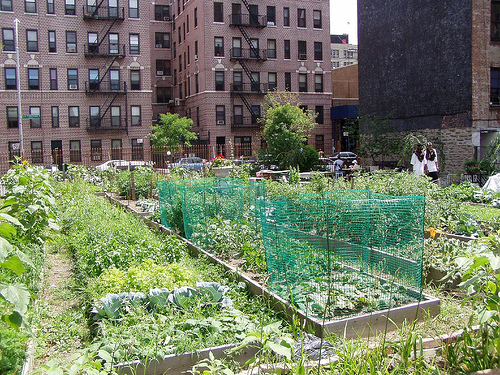
My first post brings exciting news! After battling for many years to streamline the process for starting community gardens in San Diego, local food advocacy group "1 in 10 Coalition" won a great victory for their fellow residents. Community gardens can now be started on any commercial or residential zoned land, with sale of produce allowed onsite in commercial areas. Previously the permitting process was expensive, lengthy and confusing.
This is great news, and it strikes close to home for me, as I've been working closely with Project New Village to prepare for the opening of the Mt. Hope Community Garden. With this new ordinance in place we can finally begin to break ground on the garden - a much-needed addition to a neighborhood in dire need of increased access to healthy fresh produce. It will also be the closest community garden to my own home in Encanto. I imagine the Mt. Hope Community Garden becoming a vibrant urban sanctuary as well as a place where neighbors can explore alternatives to the energy-dependent industrial food system. We'll also be helping the gardeners explore certification options so that they can then sell their extra produce at the local farmers market. All in all, this ordinance will have great benefits for both the health and economic development of the community!
FOR IMMEDIATE RELEASE
Media Contact: Parke Troutman, 1 in 10 Coalition
Friday, July 8, 2011 619.297.0295
SAN DIEGO CITY ENDORSES PEOPLE’S RIGHT TO GROW THEIR OWN FOOD
Community Gardeners Applaud the City’s Streamlined Regulations
San Diego, CA — Yesterday, Mayor Jerry Sanders signed into law new city rules that will help residents create much needed community gardens. The City Council unanimously approved the new regulations on June 7 in response to costly bureaucratic problems community groups encountered when trying to grow food in vacant lots. Momentum for change came after the International Rescue Committee spent $46,000 to get a permit for the New Roots Community Farm in City Heights.
The 1 in 10 Coalition, a local group promoting access to healthy foods, has been working for several years with Councilmember Todd Gloria to simplify the regulations. “the turning point came at the beginning of the year,” explained Diane Moss, the executive director of the non- profit Project New Village. “Council President Tony Young had allocated $50,000 to help us start a garden in Mt. Hope, but the best site SEDC could find was in a commercial zone where community gardens were not allowed. That gave the issue new urgency.” Sherri Lightner, replacing Councilmember Gloria as the chair of the Land Use and Housing Committee, pressed for a quick overhaul of the regulations, which will no longer require the expensive permitting process in residential and commercial zones.
“For the last several years, enthusiasm for community gardens has been building, and I expect that a number of the proposed gardens waiting in the wings will begin to materialize,” said Judy Jacoby, director of the San Diego Community Garden Network (SDCGN). “While we’ve been working on the code change, we’ve been creating resources to help people who want to start community gardens. Starting and running a successful community garden can be challenging and we want to help people do it right so that their garden is not only a source of fresh fruits and vegetables but is also welcomed as a positive addition in their community.” SDCGN has created a website dedicated to providing the public with information and resources on gardening.
The 1 in 10 Coalition is a network of local food activists dedicated to encouraging access to healthy food for all San Diegans. Its ten-point platform is devoted to reforming regulations concerning poultry, bees, farmers' markets, composting and, of course, community gardens. Its supporters include Victory Gardens, Healthy WorksSM School and Community Garden Program, the San Diego County Childhood Obesity Initiative, Food Not Lawns, Roots Sustainable Food Project, the International Rescue Committee, Project New Village, and the San Diego Community Garden Network (sandiegocommunitygardennetwork.org).